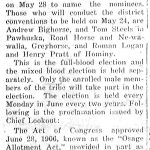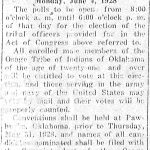May 11, 1928
The Daily Journal Capital
Microfilm Roll: MN00276
On this day in Osage country, the announcement for the upcoming, June 4, tribal election was published in The Daily Journal-Capital.
The article announced that an election would be held in order to fill the positions of “tribal chief, assistant chief, and eight members of the Osage Indian tribal council.” Additionally, the article clearly stated that the voter must be a “full blood,” male tribal member to be eligible to vote in the June election. A “mixed blood” election was to be held on a separate occasion.
Tribal elections were biennial, therefore occurring every two years, at the beginning of the month of June. Section nine of the Osage Allotment Act of 1906, created and defined the Osage tribal election as follows:
Section 9. That there shall be biennial election of officers for the Osage Tribe as follows: A principal chief, an assistant principal chief, and eight members of the Osage tribal council, to succeed the officers elected in the year nineteen hundred and six, said officers to be elected at a general election to be held in the town of Pawhuska, Oklahoma Territory, on the first Monday in June; and the first election for the said officers shall be held on the first Monday in June, nineteen hundred and eight, in manner to be prescribed by the Commissioner of Indian Affairs, said officers shall be elected for a period of two years, commencing on the first day of July following said election, and in case of vacancy in the office of principal chief by death. Resignation or otherwise, the assistant principal chief shall succeed to said office, and all the vacancies in the Osage tribal council, and the secretary of the Interior is hereby authorized to remove from the council any member or members thereof for good cause to be by him determined.
On May 31, The Daily Journal Capital released the full ticket for each party running in the election. Names found on the full blood ticket included those of Roman Logan, who ran for the position of chief, Simon Henderson for assistant chief, and Frank Tinker for councilman, to name a few. On the progressive party ticket were the names of Fred Lookout, the current chief who was running for re-election, Paul Redeagle for assistant chief, and George Alburty for a councilmen position. The article went on to discuss a few of the major changes in recent elections stating that “up until 1916 the full bloods [had] always had the major control in tribal affairs,” at which time, “only two members of the council could be mixed bloods.” With the change in rules, the Progressive party, predominantly consisting of “mixed bloods”, became the dominant party.
As planned, the tribal election was held on June 4, 1928. That afternoon the newspaper announced that over two hundred votes were cast by three o’clock, still three hours before the close of the election. The next day, on the front page of The Daily Journal Capital, was the headline “Present Chief is Re-elected by 161 to 103 Vote.” For the third time in a row, Chief Fred Lookout, was named tribal chief.
Morgan M. Guzman
“Chief Names Six to Call District Meetings May 24.” The Daily Journal Capital. May 11, 1928, p. 1 & 6. Microfilm roll number MN00276. Sequoyah National Research Center, Little Rock, Arkansas.
Further Reading
“Full Ticket is named by Both Parties in Tribe.” The Daily Journal Capital. May 31, 1928, p. 1 & 8. Microfilm roll number MN00276. Sequoyah National Research Center, Little Rock, Arkansas.
“Election in Progress at Agency Today.” The Daily Journal Capital. June 4, 1928, p. 1. Microfilm roll number MN00276. Sequoyah National Research Center, Little Rock, Arkansas.
“Present Chief is Re-elected by 161 to 103 Vote.” The Daily Journal Capital. June 5, 1928, p 1 & 6. Microfilm roll number MN00276. Sequoyah National Research Center, Little Rock, Arkansas.
Source File(s)
Related Stories
- Change in Indian Affairs is proposed by Senator Thomas
- Discussion of Government Control of the American Indian by Congressmen
- Changes Made in Osage Indian Grazing Leases
- Indian Federation Hears Politicians

